We were not the first
Sometime ago, sometime before 600 million years ago, during the Ediacaran, something exciting had just happened. It might have been lost in the chaos of what else was happening, so seemingly small and insignificant at that moment. After all the world had relatively recently escaped one of the great calamities to have ever hit.
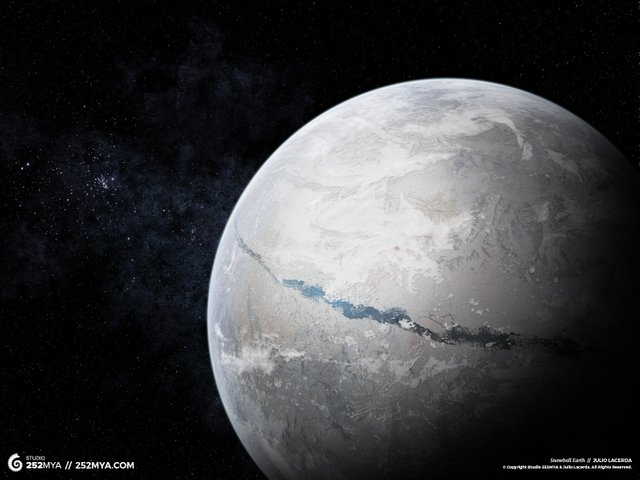
Not too long before, closer in time to our amazing event than we are to the dinosaurs ruling the Earth, there had been world wide glaciations, the so-called Snowball Earth, had receded and threatened to return, yet receded again. These tumultuous and world spanning glaciations covered all of the land and quite possibly all of the ocean with ice. The world, our world, our Earth would have looked like Hoth out of The Empire Strikes Back. Pole to pole covered in ice. The world at the time might have seemed doomed. We might have become yet another iceball, something like Europa, Enceladus or Titan, but somewhat warmer.
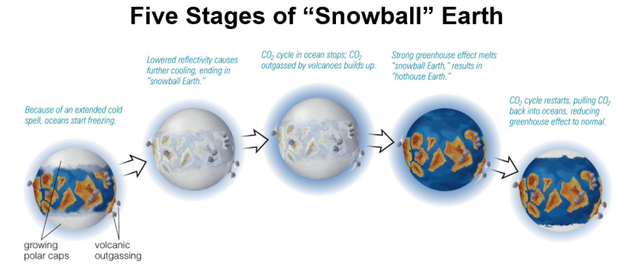
However, it appears that fantastically large volcanic eruptions spouted out vast amounts of carbon dioxide. This led to the warming of the world and the vast and fast recession of the ice. Producing world ready for the that miraculous event. That event, my friends, was the rise of complex life.
The events of the Snowball Earth glaciations, the Sturtian and Marinoan during the Cryogenian, and then the lesser ice age of the Gaskiers Glaciation, scraped the continents raw and dumped a vast amount of nutrients into the sea, far more than had been available before. This, in turn, allowed organisms to grow ever larger and more complicated. The first collection of life that appeared was called the Ediacaran Biota.
Named for the time they existed, the first fossils appeared 600 million years ago and they, the Ediacarans, would survive until a mass extinction seems to have wiped them out 541 million years ago, 59 million years after they are first detected in the fossil record. To be honest, they probably arose, at least the first members of the biota, before that time period, but the likelihood of any life becoming a fossil is very, very low. Even so, they had, in the fossil record, nearly as long as we mammals have had since the end of the dinosaurs.
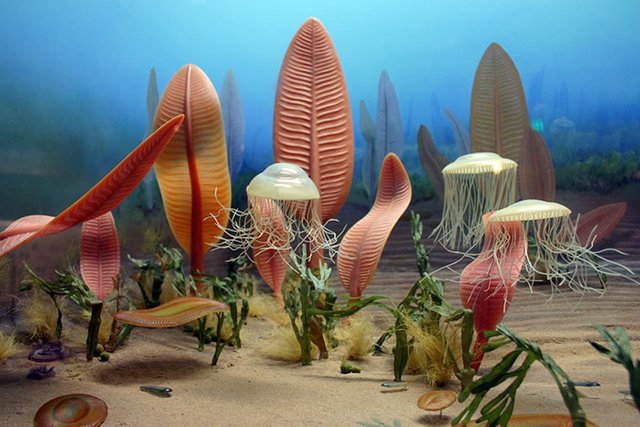
However, the Ediacarans were not like us. And they were definitely not like the dinosaurs. In fact, with a few exceptions, it appears the Ediacarans were something of a mystery. Some were called rangeomorphs and looked like modern sea pens (but were not). Some looked like discs on the seafloor. Some looked like stacked handleless cups and even formed reefs with their long, calcareous strands. Others were a touch more familiar: there were jelly fish and sponges. There is evidence of...something...that looks like a more modern animal - it left trackways, but seems to have lacked a shell or... much less. These, the Ediacarans, were came before our modern animals. They came before...us.
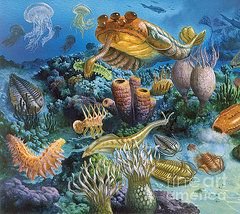
Our story began with their death. The Cambrian Explosion began after something killed off most of the Ediacarans. Shelly fossils - ones with a shell, not the author of Frankenstein - began appearing 541 million years ago and most of the Ediacarans were gone. A great BOOM of different forms of life began then and most of the ancestors of modern animal life can be found represented in the fossils therein. Even mollusks. Even arthropods. Even vertebrates. And here we are 541 million years later.
The Ediacarans, life unlike what we know, came before us. We, life like us, was definitely not the first. That ought to be fairly humbling. However, there is a nontrivial chance that the Ediacarans were not the first complex life either. Like the Ediacarans, this biota seems to have disappeared. However, unlike the Ediacarans, they do not appear to be even remotely related to us. Their fossils, so far, seem to be restricted to one place, but given their age - 2.1 billion years old - that's not a surprise: there are less rocks of the older ages simply because they get weathered away. But, there are some of that age and they are found in Franceville, Gabon in Africa.
Outside Franceville in the country of Gabon, there are deposits that date back to the PaleoProterozoic, during a period called the Rhyacian. Interestingly, there were tumultuous events "just" before this time frame, 100 million years prior, there had been a massive glaciation, the Huronian, that may have peaked at or near the Snowball Earth level. Even MORE interesting was the relatively recent Great Oxygenation Event, where photosynthetic cyanobacteria had finally produced enough oxygen in the atmosphere to be detectable through geological time. It has been theorized this may have led to the early experiment in complex life.
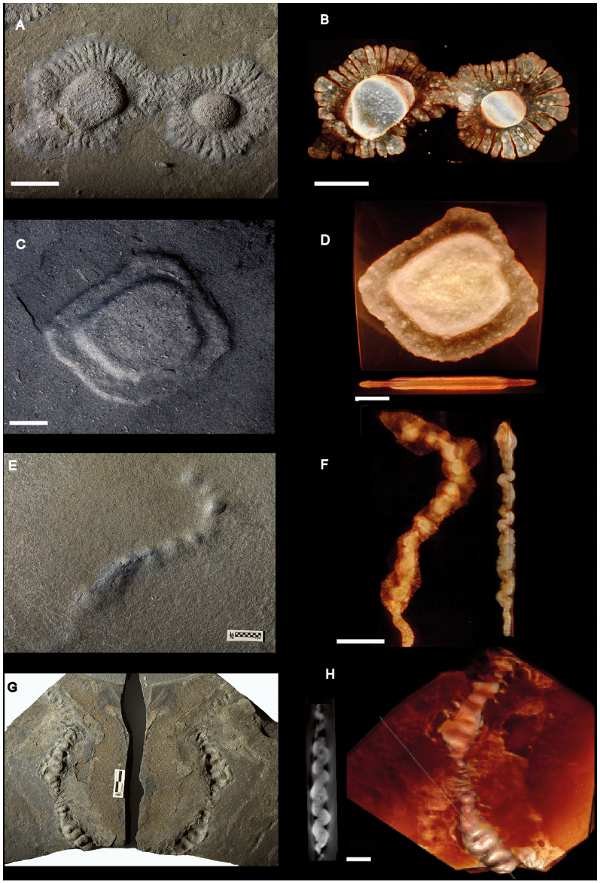
And that life was strange. Many of the fossils look like fried eggs. Or long tethered blobs. None of them look like life today. Not a lot of research has been done as yet on them. Most has gone into verifying what they are and the context of their fossilization and the environment they lived in. None of the Francevillian Biota, unfortunately, left descendants either.
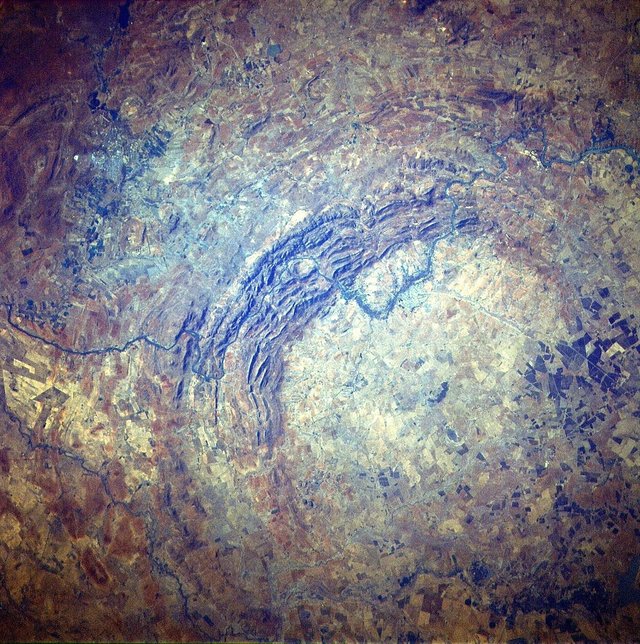
Whether it was a drop in atmospheric oxygen levels or one of the great asteroid impacts like the Vredefort astrobleme from 2.02 billion years ago - far larger than the Chicxulub dinosaur killer - or the even bigger Sudbury Impact 1.86 billion years ago or even some as yet unidentified volcanic eruption or something else entirely, we don't know. We do know the world slipped into the so-called Boring Billion when life was almost entirely microbial in size for approximately a billion years. It does appear atmospheric oxygen levels dropped and life on Earth fell into a rut. One that wouldn't be broken until the second stab at complex life came took place...by the Ediacarans, 1.3 billion years later.
However, neither the Ediacarans nor the Cambrians - those of us the umpteenth generation derived from the Cambrian Explosion - were the first complex life on Earth. That honor goes to the Francevillians, dead and gone over 2 billion years ago.
Congratulations @anzha! You have completed the following achievement on Steemit and have been rewarded with new badge(s) :
Click on the badge to view your Board of Honor.
If you no longer want to receive notifications, reply to this comment with the word
STOPTo support your work, I also upvoted your post!